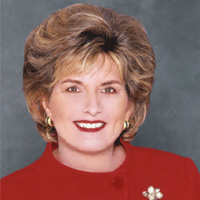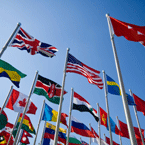
Fall 2004
The Courage to Lead
I recently sat with our daughter watching The Wizard of Oz. My favorite character of that movie is the large and weepy Lion who joins Dorothy, The Scarecrow and The Tin Man on their journey to Oz. The Cowardly Lion is searching for a basic human character necessity that he lacks…Courage.
What is courage? Winston Churchill called it “The first of human qualities… because it guarantees all the others”, like integrity confidence and compassion. The word comes from the French word for heart, Coeur. It also comes from the gut because it is a strong emotional commitment to take action towards an idea or ideal that has meaning for us, despite the hurdles or obstacles in our way. When we are motivated to act courageously it is because passion or duty sparks a fire in us.
There are times, like the crisis of 9/11, that brings out our courage, like the heroic passengers on Flight 93 who helped to divert a hijacked plane away from Washington D.C. or the firefighters who risked or gave up their lives to enter the burning World Trade Center Towers to save the lives of thousands of others.
But what about the smaller acts of courage it takes for us to stand tall in our everyday work lives…to be the only outspoken optimist in a meeting of naysayers, to ask for a raise because you deserve it, to turn down a promotion for the sake of your family, to blow the whistle on questionable work practices.
This issue was brought into our home as Election Day approached. Our third-grade daughter came home one day complaining that “the kids are making fun of me”. When asked why, she said “I'm an elephant and they're all donkeys”. What ensued was a life lesson discussion, not about the relative merits of either political party, but about the need to learn how to communicate what you believe in and how to maintain “the courage of your convictions”, even in the face of opposition and resistance, including schoolyard friends.
Senator John McCain, a former POW, explains that for courage to exist, there must be fear: physical or psychological, real or perceived. What has motivated him to overcome those real and present fears is the fear of potential future remorse. “The sinking feeling that if you do not take action consistently with your values you will have to live with not being the person you could have been.”
We live in a time when risk-taking, driven by convictions is a rarity, which is why you will stand out from the crowd if you stand up to be counted on to act. We're all afraid of something. Instead of focusing on our fears of harm and loss, focus forward and find the courage as Eleanor Roosevelt put it “to do the things you think you cannot do.” Remember, leaders who lack courage aren't leaders.
The Courage to Act by Dr. Merom Klein and Ron Napier
There are a myriad of biographies/autobiographies on such courageous heroes as John McCain author of Why Courage Matters or Commander Shackleton, whose Antarctic expedition is described in Leading at the Edge. However there are few texts about courage for those of us mere mortals who are just trying to succeed in our daily lives.
Klein, founder of The Courage Institute, and Napier, a pioneer in the concept of 360- degree feedback, present a realistic assessment of the organizational challenges facing those of us who not only want to survive, but thrive. They offer practical tips and real life examples from managers and executives of Fortune 500 and other organizations who show us how to facilitate organizational change by finding more courage within ourselves and inspiring it in others. Especially interesting is their exploration of the emotions underlying the will to act and persevere.Actions for Results: Tips & Tools for Finding The Courage to Act.
Klein and Napier have identified five practices that are required to move with courage into action:
Candor: Be willing to speak the truth …and hear the truth.
Purpose: Create a better team and better organization than exists today; motivate others to join you and hold yourselves accountable for results.
Will: Be a role model for optimism and perseverance.
Rigor: Do your homework, develop contingency plans. measure your progress. Trust and Risk: Be humble, empower others, and share the rewards with others who share the risks.
“We were all inspired by your presentation on 'The Leader's Legacy.' If you don't mind, I'd like to pass on some of your thoughts to the rest of the organization.”
Bonnie Lieberman
Senior Vice President
& General Manager
John Wiley & Sons, Inc
Ask or Tell We want to hear from you- whether it is a question or a suggestion! Are you or your organization facing a particular performance challenge? Leadership issues? Turf wars instead of teamwork? Struggling with a major change? Expanding globally, but not collaborating across borders? Frustrated with lack of business growth? |







